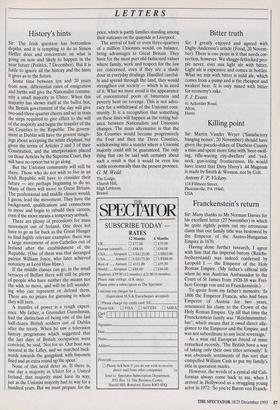LETTERS History's hints
Sir: The Irish question has bottomless depths, and it is tempting to do as Simon Heifer does and concentrate on what is going on now and likely to happen in the near future (Politics, 7 December). But it is futile to ignore all the history and the hints it gives as to the future.
Some time between ten and 20 years from now, differential rates of emigration and births will give the Nationalist commu- nity a small majority in Ulster. When this majority has shown itself at the ballot box, the British government of the day will give two-and-three-quarter cheers and set in train the steps required to give effect to the will of the majority and begin the transfer of the Six Counties to the Republic. The govern- ment in Dublin will have the gravest misgiv- ings about accepting the white elephant, but given the terms of Articles 2 and 3 of their Constitution, and the interpretation placed on those Articles by the Supreme Court, they will have no option but to go along. But the Unionist community will still be there. Those who do not wish to live in an Irish Republic will have to consider their future — are perhaps beginning to do so. Many of them will move to Great Britain. The professional and middle classes would, I guess, lead the movement. They have the background, qualifications and connections to move and begin to rebuild their careers, even if the move means a temporary setback. There are plenty of precedents for mass movement out of Ireland. One does not have to go as far back as the Great Hunger to find highly relevant examples: there was a large movement of non-Catholics out of Ireland after the establishment of the Republic. (One of them was that deranged patriot William Joyce, who later achieved notoriety as Lord Haw-Haw.) If the middle classes can go, in the small terraces of Belfast there will still be plenty of people who have neither the means nor the wish to move, and will be left wonder- ing who can represent or defend them. There are no prizes for guessing to whom they will turn. A transfer of power is a rough experi- ence. My father, a Grenadier Guardsman, had the distinction of being one of the last half-dozen British soldiers out of Dublin after the treaty. When he saw a television history programme which suggested that the last days of British occupation were convivial, he said, 'Not for us. Our boat was moored in the Liffey, and we marched back- wards towards the gangplank with bayonets fixed and an extra round up the spout.'
None of this need deter us. If there is, one day a majority in Ulster for a United Ireland, that majority must have its way, just as the Unionist majority had its way for a hundred years. But we must prepare for the price, which is partly families standing among their suitcases on the quayside at Liverpool.
The arrival of half or even three-quarters of a million Unionists would, on balance, bring advantages to Great Britain. They have for the most part old-fashioned values where family, work and respect for the law are concerned, even if they are a shade dour in everyday dealings. Handled careful- ly and spread through the land, they would strengthen our society — which is in need of it. What we must avoid is the appearance of concentrated pools of bitterness and poverty bent on revenge. This is not advo- cacy for a withdrawal of the Unionist com- munity. It is a recognition that something on these lines will happen as the voting bal- ance between Nationalists and Unionists changes. The main alternative is that the Six Counties would become progressively the Four and then the Three Counties, withdrawing into a statelet where a Unionist majority could still be guaranteed. The only thing that can be said with certainty about such a result is that it would be even less viable economically than the present province.
G. M. Wedd
The Lodge, Church Hill, High Littleton, Bristol










































































































 Previous page
Previous page